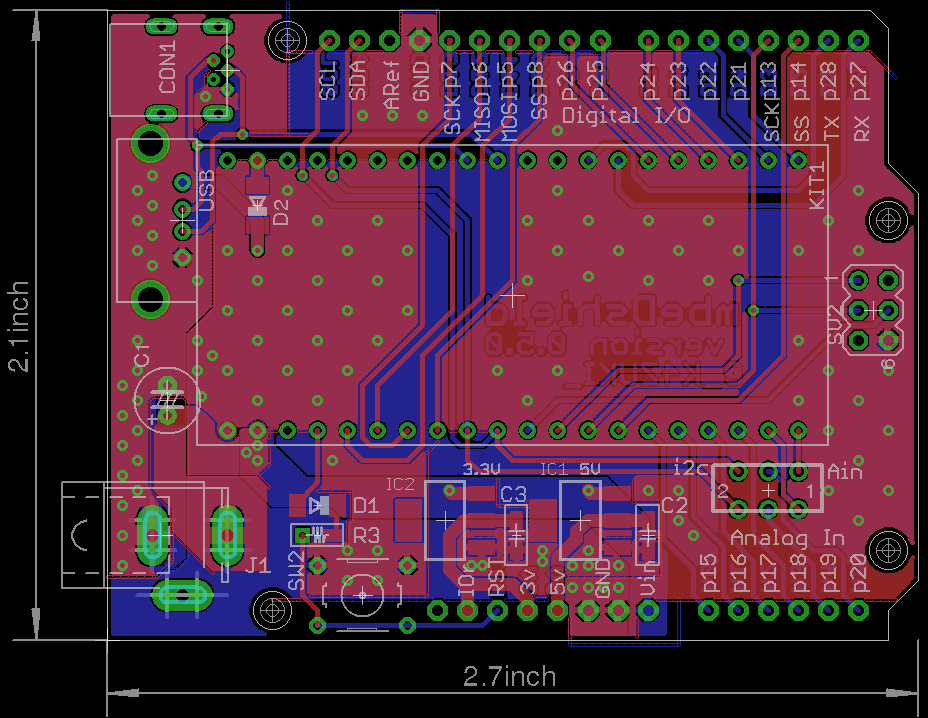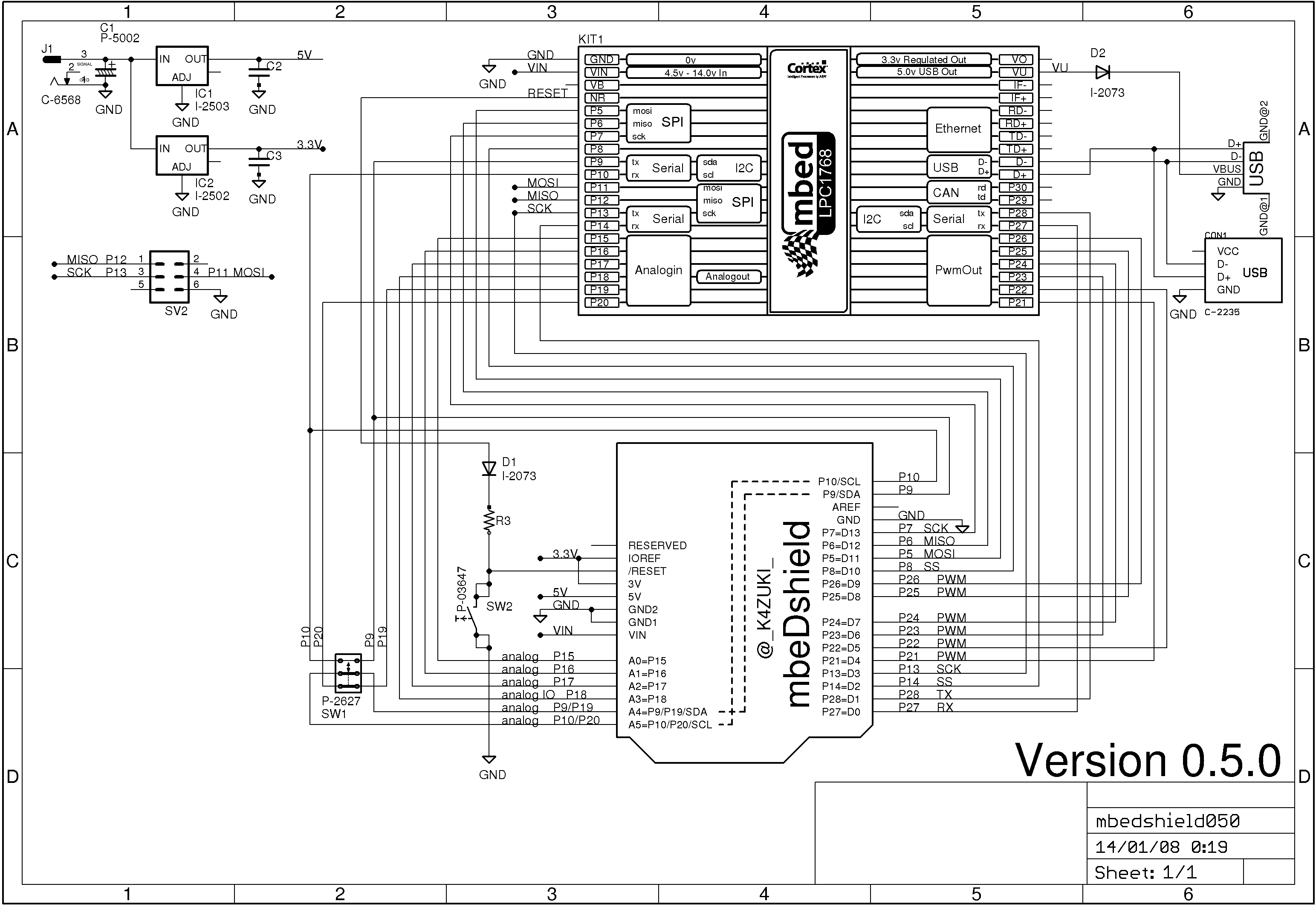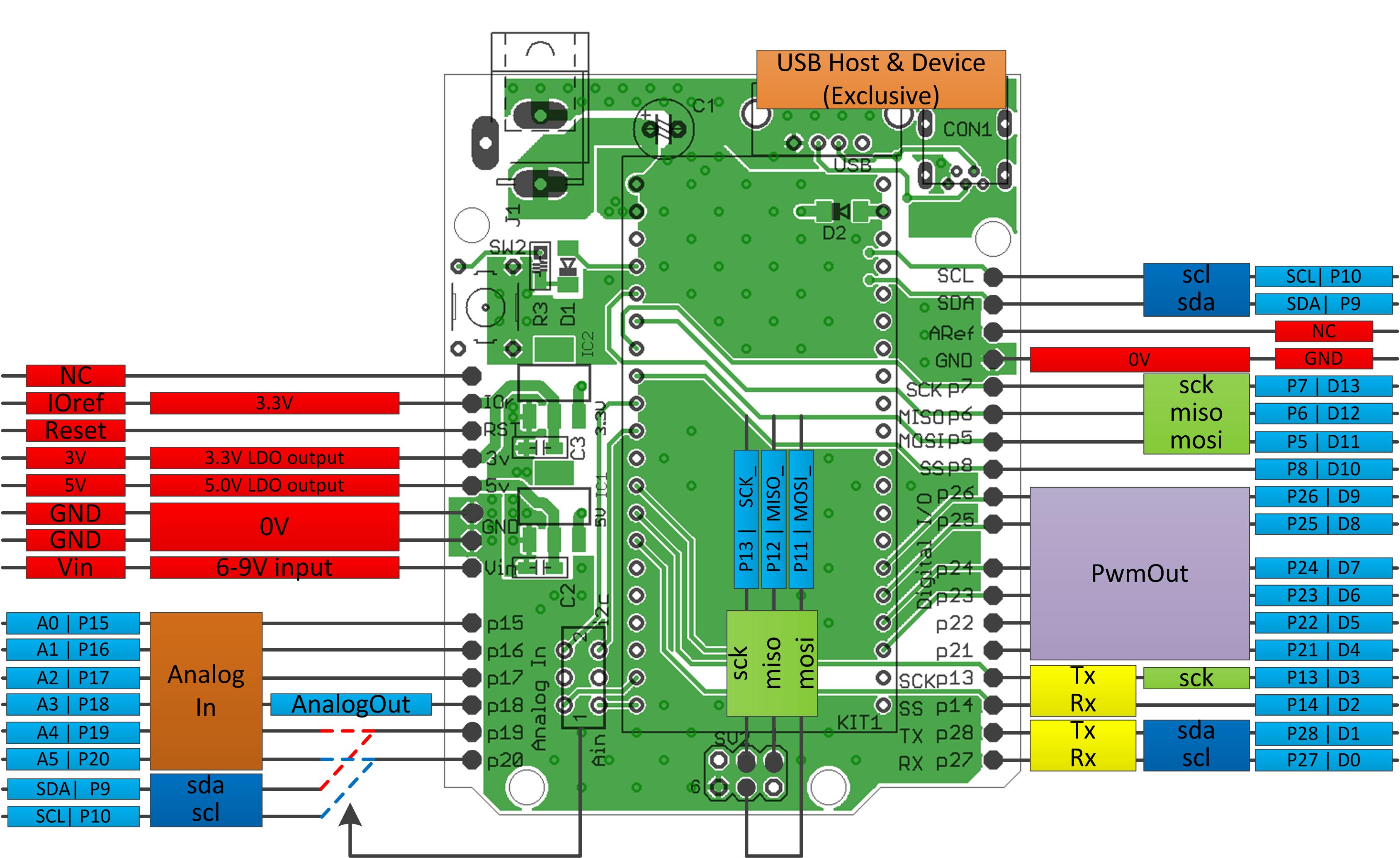The official mbed C/C SDK provides the software platform and libraries to build your applications.
Fork of mbed by
(01.May.2014) started sales! http://www.switch-science.com/catalog/1717/
(13.March.2014) updated to 0.5.0
This is a pin conversion PCB from mbed 1768/11U24 to arduino UNO.
- So if you have both mbed and arduino shields, I guess you would be happy with such a conversion board :)
Photos
- Board photo vvv

- Schematic photo vvv

- Functionality photo vvv

Latest eagle files
PCB >> /media/uploads/k4zuki/mbedshield050.brd
SCH >> /media/uploads/k4zuki/mbedshield050.sch
BIG changes from previous version
- Ethernet RJ45 connector is removed.
- http://mbed.org/components/Seeed-Ethernet-Shield-V20/ is the biggest hint to use Ethernet!
MostALL of components can be bought at Akizuki http://akizukidenshi.com/- But sorry, they do not send parts to abroad
- Pinout is changed!
| arduino | 0.4.0 | 0.5.0 |
|---|---|---|
| D4 | p12 | p21 |
| D5 | p11 | p22 |
| MOSI_ | none | p11 |
| MISO_ | none | p12 |
| SCK_ | none | p13 |
This design has bug(s)
- I2C functional pin differs between 1768 and 11U24.
Fixed bugs here
- MiniUSB cable cannot be connected on mbed if you solder high-height electrolytic capacitor on C3.
- http://akizukidenshi.com/catalog/g/gP-05002/ is the solution to make this 100% AKIZUKI parts!
- the 6-pin ISP port is not inprimented in version 0.4.0
it will be fixed in later version 0.4.1/0.4.2/0.5.0This has beenfixed
I am doing some porting to use existing arduino shields but it may faster if you do it by yourself...
you can use arduino PinName "A0-A5,D0-D13" plus backside SPI port for easier porting.
To do this you have to edit PinName enum in
- "mbed/TARGET_LPC1768/PinNames.h" or
- "mbed/TARGET_LPC11U24/PinNames.h" as per your target mbed.
here is the actual list: This list includes define switch to switch pin assignment
part_of_PinNames.h
USBTX = P0_2,
USBRX = P0_3,
//from here mbeDshield mod
D0=p27,
D1=p28,
D2=p14,
D3=p13,
#ifdef MBEDSHIELD_050
MOSI_=p11,
MISO_=p12,
SCK_=p13,
D4=p21,
D5=p22,
#else
D4=p12,
D5=p11,
#endif
D6=p23,
D7=p24,
D8=p25,
D9=p26,
D10=p8,
D11=p5,
D12=p6,
D13=p7,
A0=p15,
A1=p16,
A2=p17,
A3=p18,
A4=p19,
A5=p20,
SDA=p9,
SCL=p10,
//mbeDshield mod ends here
// Not connected
NC = (int)0xFFFFFFFF
Diff: CAN.h
- Revision:
- 43:e2ed12d17f06
- Parent:
- 33:5364839841bd
- Child:
- 44:24d45a770a51
--- a/CAN.h Wed Aug 29 12:44:47 2012 +0100
+++ b/CAN.h Fri Oct 26 17:40:46 2012 +0100
@@ -21,15 +21,13 @@
namespace mbed {
-/* Class: CANMessage
- *
+/** CANMessage class
*/
class CANMessage : public CAN_Message {
public:
- /* Constructor: CANMessage
- * Creates empty CAN message.
+ /** Creates empty CAN message.
*/
CANMessage() {
len = 8;
@@ -39,8 +37,7 @@
memset(data, 0, 8);
}
- /* Constructor: CANMessage
- * Creates CAN message with specific content.
+ /** Creates CAN message with specific content.
*/
CANMessage(int _id, const char *_data, char _len = 8, CANType _type = CANData, CANFormat _format = CANStandard) {
len = _len & 0xF;
@@ -50,8 +47,7 @@
memcpy(data, _data, _len);
}
- /* Constructor: CANMessage
- * Creates CAN remote message.
+ /** Creates CAN remote message.
*/
CANMessage(int _id, CANFormat _format = CANStandard) {
len = 0;
@@ -62,30 +58,26 @@
}
#if 0 // Inhereted from CAN_Message, for documentation only
- /* Variable: id
- * The message id.
+ /** The message id.
*
- * If format is CANStandard it must be an 11 bit long id
- * If format is CANExtended it must be an 29 bit long id
+ * - If format is CANStandard it must be an 11 bit long id.
+ * - If format is CANExtended it must be an 29 bit long id.
*/
unsigned int id;
- /* Variable: data
- * Space for 8 byte payload.
+ /** Space for 8 byte payload.
*
* If type is CANData data can store up to 8 byte data.
*/
unsigned char data[8];
- /* Variable: len
- * Length of data in bytes.
+ /** Length of data in bytes.
*
* If type is CANData data can store up to 8 byte data.
*/
unsigned char len;
- /* Variable: format
- * Defines if the message has standard or extended format.
+ /** Defines if the message has standard or extended format.
*
* Defines the type of message id:
* Default is CANStandard which implies 11 bit id.
@@ -93,8 +85,7 @@
*/
CANFormat format;
- /* Variable: type
- * Defines the type of a message.
+ /** Defines the type of a message.
*
* The message type can rather be CANData for a message with data (default).
* Or CANRemote for a request of a specific CAN message.
@@ -103,128 +94,115 @@
#endif
};
-/* Class: CAN
- * A can bus client, used for communicating with can devices
+/** A can bus client, used for communicating with can devices
*/
class CAN : public Base {
public:
- /* Constructor: CAN
- * Creates an CAN interface connected to specific pins.
+ /** Creates an CAN interface connected to specific pins.
+ *
+ * @param rd read from transmitter
+ * @param td transmit to transmitter
*
* Example:
- * > #include "mbed.h"
- * >
- * > Ticker ticker;
- * > DigitalOut led1(LED1);
- * > DigitalOut led2(LED2);
- * > CAN can1(p9, p10);
- * > CAN can2(p30, p29);
- * >
- * > char counter = 0;
- * >
- * > void send() {
- * > if(can1.write(CANMessage(1337, &counter, 1))) {
- * > printf("Message sent: %d\n", counter);
- * > counter++;
- * > }
- * > led1 = !led1;
- * > }
- * >
- * > int main() {
- * > ticker.attach(&send, 1);
- * > CANMessage msg;
- * > while(1) {
- * > if(can2.read(msg)) {
- * > printf("Message received: %d\n\n", msg.data[0]);
- * > led2 = !led2;
- * > }
- * > wait(0.2);
- * > }
- * > }
- *
- * Variables:
- * rd - read from transmitter
- * td - transmit to transmitter
+ * @code
+ * #include "mbed.h"
+ *
+ * Ticker ticker;
+ * DigitalOut led1(LED1);
+ * DigitalOut led2(LED2);
+ * CAN can1(p9, p10);
+ * CAN can2(p30, p29);
+ *
+ * char counter = 0;
+ *
+ * void send() {
+ * if(can1.write(CANMessage(1337, &counter, 1))) {
+ * printf("Message sent: %d\n", counter);
+ * counter++;
+ * }
+ * led1 = !led1;
+ * }
+ *
+ * int main() {
+ * ticker.attach(&send, 1);
+ * CANMessage msg;
+ * while(1) {
+ * if(can2.read(msg)) {
+ * printf("Message received: %d\n\n", msg.data[0]);
+ * led2 = !led2;
+ * }
+ * wait(0.2);
+ * }
+ * }
+ * @endcode
*/
CAN(PinName rd, PinName td);
virtual ~CAN();
- /* Function: frequency
- * Set the frequency of the CAN interface
+ /** Set the frequency of the CAN interface
+ *
+ * @param hz The bus frequency in hertz
*
- * Variables:
- * hz - The bus frequency in hertz
- * returns - 1 if successful, 0 otherwise
+ * @returns
+ * 1 if successful,
+ * 0 otherwise
*/
int frequency(int hz);
- /* Function: write
- * Write a CANMessage to the bus.
+ /** Write a CANMessage to the bus.
+ *
+ * @param msg The CANMessage to write.
*
- * Variables:
- * msg - The CANMessage to write.
- *
- * Returns:
- * 0 - If write failed.
- * 1 - If write was successful.
+ * @returns
+ * 0 if write failed,
+ * 1 if write was successful
*/
int write(CANMessage msg);
- /* Function: read
- * Read a CANMessage from the bus.
+ /** Read a CANMessage from the bus.
*
- * Variables:
- * msg - A CANMessage to read to.
+ * @param msg A CANMessage to read to.
*
- * Returns:
- * 0 - If no message arrived.
- * 1 - If message arrived.
+ * @returns
+ * 0 if no message arrived,
+ * 1 if message arrived
*/
int read(CANMessage &msg);
- /* Function: reset
- * Reset CAN interface.
+ /** Reset CAN interface.
*
* To use after error overflow.
*/
void reset();
- /* Function: monitor
- * Puts or removes the CAN interface into silent monitoring mode
+ /** Puts or removes the CAN interface into silent monitoring mode
*
- * Variables:
- * silent - boolean indicating whether to go into silent mode or not
+ * @param silent boolean indicating whether to go into silent mode or not
*/
void monitor(bool silent);
- /* Function: rderror
- * Returns number of read errors to detect read overflow errors.
+ /** Returns number of read errors to detect read overflow errors.
*/
unsigned char rderror();
- /* Function: tderror
- * Returns number of write errors to detect write overflow errors.
+ /** Returns number of write errors to detect write overflow errors.
*/
unsigned char tderror();
- /* Function: attach
- * Attach a function to call whenever a CAN frame received interrupt is
+ /** Attach a function to call whenever a CAN frame received interrupt is
* generated.
*
- * Variables:
- * fptr - A pointer to a void function, or 0 to set as none
+ * @param fptr A pointer to a void function, or 0 to set as none
*/
void attach(void (*fptr)(void));
- /* Function attach
- * Attach a member function to call whenever a CAN frame received interrupt
+ /** Attach a member function to call whenever a CAN frame received interrupt
* is generated.
*
- * Variables:
- * tptr - pointer to the object to call the member function on
- * mptr - pointer to the member function to be called
+ * @param tptr pointer to the object to call the member function on
+ * @param mptr pointer to the member function to be called
*/
template<typename T>
void attach(T* tptr, void (T::*mptr)(void)) {
